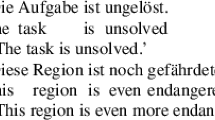Abstract
This commentary discusses four main claims about German adjectival participles made by Gehrke (this issue): (i) that events in adjectival participles are uninstantiated kinds, not tokens, (ii) that DPs in modifiers and by-phrases in participles are referentially opaque, (iii) that modifiers/by-phrases pseudo-incorporate into the participles, and (iv) that participle+modifier/by-phrase combinations refer to established (nameworthy) event-kinds. I defend claims (i)–(iii) in the face of potential counterevidence, but argue against claim (iv). I also motivate the generalisation that modifiers/by-phrases are licit only if they contribute to the description of the state expressed by the participle.
Similar content being viewed by others
Notes
Studies on English use AP-selecting verbs like seem and remain to force the adjectival reading, but this has its pitfalls. Some speakers impose strict conditions on the kind of evidentiality that seem+AP can express, yielding judgments like The text {is/ ?? seems} written by a genius. If only seem-sentences are examined, we might wrongly blame the reduced acceptability on factors internal to the participle projection. The verb remain requires reversible result states, which excludes many good adjectival participles (the novel {is/*remains} well-written).
More evidence for the characterising-the-theme function of adjectival participles is given in (22). Maienborn captures such effects by writing into the semantics an underspecified predication over the theme which is given content via pragmatic reasoning (cf. G, Sect. 3.3). These effects might instead be implicatures triggered by the topic-comment structure of adjectival participles.
English speakers also display mixed reactions to temporal modification in adjectival participles. Examples like (i–ii) are well-attested, but to me unacceptable. I fully accept recently-data like (iii), but reject (*) It is recently available, suggesting that my idiolect treats recently in (iii) as a modifier of events and not states.
-
(i)
wThe story is written in the fourteenth century…
-
(ii)
wThis factory is built in the thirties … at that time it was located outside the city.
-
(iii)
This book is recently published. The restaurant is recently opened.
-
(i)
The Non-Referential Satellite Hypothesis would follow from the Event Kind Hypothesis under the premise that referentially instantiated event participants require instantiated event-tokens. I dispute the premise since (i) and (ii) have instantiated participants in uninstantiated folding and opening events.
-
(i)
This chairi folds flat easily. I’ll let you fold iti for the first time.
-
(ii)
I just made a hook for opening that high windowi. I will now open iti for the first time.
-
(i)
German, like English, productively incorporates bare heads into participles, cf. (i–iii) below. Whether this supports the PIH is unclear since Maienborn and Geldermann (2013) argue that the incorporated nominals merge higher than PP satellites and are subject to different interpretational principles. The parallels break down in cases like beinamputierte Menschen ‘leg-amputated people’ where there is no corresponding PP satellite.
-
(i)
feuerbeschädigt/von Feuer beschädigt ‘fire-damaged/damaged by fire’
-
(ii)
verbinkorporiert/ins Verb inkorporiert ‘verb-incorporated/incorporated into V’
-
(iii)
handgeschrieben/mit der Hand geschrieben ‘handwritten/written by hand’
-
(i)
Unlike German participle+von-phrase structures, agent-incorporating compounds like (28c) are apparently confined to established kinds in which the agents do more to classify the event-kind than the patient/theme arguments do. Interestingly, Beste Kamali (p.c.) confirms that the Turkish agent-pseudo-incorporation construction described in Öztürk (2009) works for these kinds of situations but not for clearly un-nameworthy situations like policeman-snore or child-see (the dog).
References
Bouchard, Denis. 2011. Review of Guglielmo Cinque. The syntax of adjectives. Linguist List. www.linguistlist.org/issues/22/22-2513.html.
Bruening, Benjamin. 2014. Word formation is syntactic: Adjectival passives in English. Natural Language and Linguistic Theory 32: 363–422.
Frey, Werner. 2003. Syntactic conditions on adjunct classes. In Modifying Adjuncts, eds. Ewald Lang, Claudia Maienborn, and Cathrine Fabricius-Hansen, 163–209. Berlin: Mouton de Gruyter.
Gehrke, Berit. 2012. Passive States. In Telicity, Change and State, eds. Violeta Demonte and Louise McNally, 185–211. Oxford: Oxford University Press.
Gehrke, Berit. this issue. Adjectival participles, event kind modification and pseudo-incorporation. Natural Language and Linguistic Theory.
Gese, Helga. 2011. Events in adjectival passives. In Sinn und Bedeutung, eds. Ingo Reich, Eva Horch, and Dennis Pauly, Vol. 15, 259–273. Münster: Monsenstein.
Gese, Helga. 2012. Empirische Studien zum Zustandspassiv. Doctoral thesis, University of Tübingen.
Jacobs, Joachim. 1993. Integration. In Wortstellung und Informationsstruktur, ed. Marga Reis, 63–116. Tübingen: Niemeyer.
Jacobs, Joachim. 1999. Informational Autonomy. In Focus: Linguistic, cognitive, and computational perspectives, eds. Peter Bosch and Rob van der Sandt, 56–81. Cambridge: Cambridge University Press.
Massam, Diane. 2009. Noun Incorporation. Language and Linguistics Compass 3: 1–21.
Maienborn, Claudia. 2001. On the position and interpretation of locative modifiers. Natural Language Semantics 9: 191–240.
Maienborn, Claudia. 2011. Strukturausbau am Rande der Wörter: adverbiale Modifikatoren beim Zustandspassiv. In Sprachliches Wissen zwischen Lexikon und Grammatik, eds. Stefan Engelberg, Anke Holler, and Kristel Proost, 317–343. Berlin: de Gruyter.
Maienborn, Claudia, and Sascha Geldermann. 2013. ‘Expertengeprüft’ und ‘vom Experten geprüft’. In Interfaces of Morphology, ed. Holden Härtl, 127–161. Berlin: Academie.
McIntyre, Andrew. 2013. Adjectival passives and adjectival participles in English. In Non-Canonical Passives, eds. Artemis Alexiadou and Florian Schäfer, 21–41. Amsterdam: Benjamins.
Meltzer-Asscher, Aya. 2011. Adjectival passives in Hebrew. Natural Language and Linguistic Theory 29: 815–855.
Öztürk, Balkiz. 2009. Incorporating agents. Lingua 119: 334–358.
Rapp, Irene. 1997. Partizipien und semantische Struktur. Tübingen: Stauffenburg.
Roßdeutscher, Antje. 2000. Lexikalisch gestützte formale Textinterpretation. Habilitation thesis, Universität Stuttgart.
Schlücker, Barbara. 2005. Event-related modifiers in German adjectival passives. In Sinn und Bedeutung, eds. Emar Maier, Corien Bary, and Janneke Huitink, Vol. 9, 417–430. Nijmegen: Nijmegen Centre of Semantics.
Ward, Gregory, Richard Sproat, and Gail McKoon. 1991. A pragmatic analysis of so-called anaphoric islands. Language 67: 439–474.
Author information
Authors and Affiliations
Corresponding author
Rights and permissions
About this article
Cite this article
McIntyre, A. Event modifiers in (German) adjectival participles: remarks on Gehrke (this issue). Nat Lang Linguist Theory 33, 939–953 (2015). https://doi.org/10.1007/s11049-015-9285-9
Published:
Issue Date:
DOI: https://doi.org/10.1007/s11049-015-9285-9




